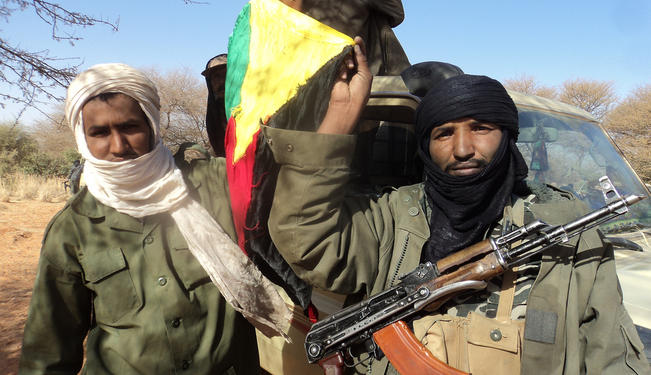
Since January 2012 Mali has been embroiled in political conflict, which has resulted in a humanitarian crisis in the region and poses a threat to international security.
Background
The West African country of Mali was for a long time considered one of the most stable states in the continent. This view changed in the beginning of this year, when in a relatively short period of time, the Tuareg population launched a rebellion that led to the Malian military’s ousting of President Amadou Toumani Touré and the rise of Islamic extremist groups in the Azawad territory. This is not the first Tuareg rebellion in Mali; they have felt for decades that the government was neglecting their needs. However, this recent rebellion has had the greatest sociopolitical impact.
This recent conflict began when the National Leadership Movement for the Liberation of Azawad (MLNA) started fighting for the independence of the Azawad in January 2012. Two months later, members of the Malian military who were disgruntled with the President Touré’s handling of the rebellion staged a coup d’état, effectively removing him from office. The emerging power vacuum made it easier for the rebels to capture important cities in the north. The following month, on April 6th, the MLNA declared the Azawad territory an independent state, but failed to get recognition from the international community.
The MLNA was not the only group advocating their cause in Azawad. Islamic extremist groups such as the Ansar Dine and al-Qaeda in the Islamic Maghreb (AQIM) soon gained power. Though there is conflicting information over the exact relationship between the various groups acting in the Azawad, it seems the MLNA had collaborated with the Ansar Dine in spite of their differing goals. While the MLNA wanted Azawad to become an independent state, the Ansar Dine hoped to spread their radical religious views in the territory. Over time, the Ansar Dine turned against the MLNA and, after some violent clashes, managed to overpower them in many of Azawad’s key cities.
Why is this Conflict Relevant?
This conflict, which has persisted for over half a year, has resulted in a humanitarian crisis that not only has affected Mali but the entire region. According to the UNHCR, 400,000 people have been displaced. Many from Azawad have escaped fighting and severe human rights violations to Mali’s neighboring countries such as Burkina Faso, Mauritania, and Niger, countries which are already struggling to provide enough resources for their own population.
In Mali itself the population is not only suffering from extremist violence but also from a severe food shortage. In addition, the conflict may also threaten international security in the future. If the instability continues, Azawad could become a safe haven for terrorist groups, a threat that should not only concern Mali but also the international community. But despite recent talks of intervention, it seems unlikely that the situation will be brought under control anytime soon, though a quick solution is needed to ensure peace for Mali.
The views expressed in this article are the author's own and do not necessarily reflect Fair Observer's editorial policy.
For more than 10 years, Fair Observer has been free, fair and independent. No billionaire owns us, no advertisers control us. We are a reader-supported nonprofit. Unlike many other publications, we keep our content free for readers regardless of where they live or whether they can afford to pay. We have no paywalls and no ads.
In the post-truth era of fake news, echo chambers and filter bubbles, we publish a plurality of perspectives from around the world. Anyone can publish with us, but everyone goes through a rigorous editorial process. So, you get fact-checked, well-reasoned content instead of noise.
We publish 2,500+ voices from 90+ countries. We also conduct education and training programs on subjects ranging from digital media and journalism to writing and critical thinking. This doesn’t come cheap. Servers, editors, trainers and web developers cost money.
Please consider supporting us on a regular basis as a recurring donor or a sustaining member.
Support Fair Observer
We rely on your support for our independence, diversity and quality.
Will you support FO’s journalism?
We rely on your support for our independence, diversity and quality.






